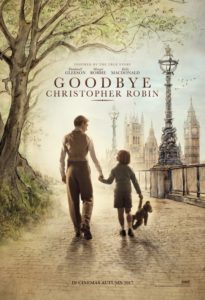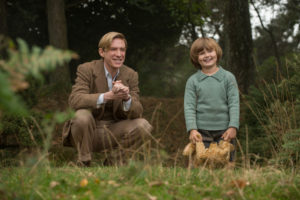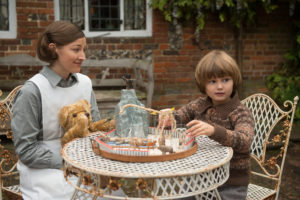Film Review: “Goodbye Christopher Robin” Moves Despite Its Fabulation
Written by: Christopher Llewellyn Reed | October 26th, 2017

Goodbye Christopher Robin (Simon Curtis, 2017) 2½ out of 4 stars.
In many ways a complex exploration of the twin challenges of artistic creation and parenting, Goodbye Christopher Robin nevertheless strays distressingly from the real facts of the case. Based on the life of British author A.A. Milne – who gave us Winnie the Pooh – and on his relationship with his wife Daphne and son Christopher Robin (the inspiration for the character of the same name in the books), the film – like all biopics – earns our initial interest by virtue of its status as dramatized truth. As drama, it is moving, even deeply so; as truth, sadly, it takes some liberties. Why does this matter? Well, even in our age of mainstreamed fabricated facts, why should we invest in an invented biography, particularly a final reconciliation that probably never happened?
Domhnall Gleeson (Brooklyn) plays Milne – first name Alan, called Blue by family and friends – a successful London playwright suffering from post-World War One PTSD, who embarks on an ambitious project to pen an anti-war novel only to get distracted by the games of his young son. The movie starts years later, during the next war, as Mr. and Mrs. Milne await news of the now-adult Christopher’s fate. We then flash back to the father’s own combat experience, his love affair with Daphne (Margot Robbie, The Legend of Tarzan) and theatrical triumphs, followed by the birth of Christopher, subsequent hiring of a nanny, the parents’ active social life, and Milne’s eventual disillusionment with the futility of it all in the face of his ever-present trauma. Director Simon Curtis (My Week with Marilyn) is to be commended for the briskly efficient way he takes us through these various beats, showing us just enough details to make the family dynamics clear.

It’s when Milne buys his house in the country that the movie really comes alive. There, the simmering tensions between husband (who just wants to write) and wife (who just wants to party) erupt. Daphne decamps for the city, leaving Milne and Christopher (newcomer Will Tilston) alone with Olive, the nanny (Kelly Macdonald, Margaret on HBO’s Boardwalk Empire), who shortly thereafter takes off, as well, to care for her sick mother. And so the two blokes make do, the one annoyed, the other craving affection. But a funny thing happens along the way to mutual dissatisfaction: dad starts observing his boy at play, and finds inspiration for his next work. These sequences in the woods are lovely. Gleeson acts his part with just enough emotional restraint to illuminate his dawning appreciate of his child with deft wit and charm. Tilston is adorable and utterly natural, avoiding the overly clowying cuteness of some young performers. Curtis and his crew shoot the scenes in an almost fable-like manner, appropriate for how they will later be incorporated into Milne’s books.
Things quickly sour as both parents – the mother, especially – are swept up in the promotional whirlwind prompted by Pooh‘s quick success. Poor Christopher is used mercilessly in photo ops and media events, despite Olive’s protestations. This is where we seem to depart from the historical record, at least as far as I can tell in my, granted, limited research (google Milne, yourself, and come to your own conclusions), as the movie takes a clear stand on who is mostly to blame, focusing its ire on Daphne. And so we have a simple dichotomy as old as the bible: essentially good man, led astray by fallen woman. That is unfortunate, particularly today.

Still, the strengths of those father-son moments, and the beautifully cinematic manner in which the inpsiration for Winnie the Pooh is realized almost makes up for its anti-mother agenda. But then flash forward back to World War Two, and the neat, pat ending filled with expositional mea culpas and forgiveness rings false, both dramatically and historically. I enjoyed myself, and fought back more than a few tears, but feel a little betrayed now that I know the conclusion is most likely a complete invention of the screenwriters. But moved I was, in spite of it all. You may be, too, but you have been warned.

